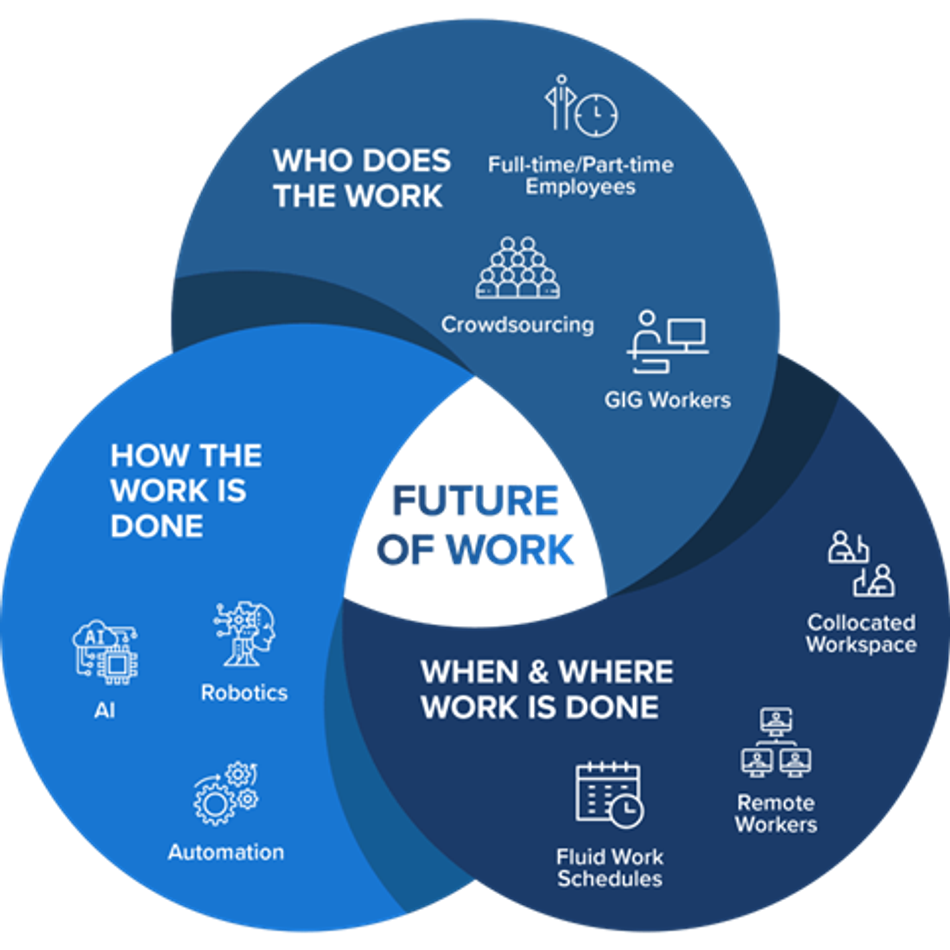AI Capital & the Future of Work: The Importance of Democratizing AI to Unlock Innovation and Economic Growth
AI capital – the emerging capital resource for businesses and the economy as a whole. With AI capital, it is transforming the nature of work and creating new opportunities and challenges for businesses and workers. The future of work will be characterized by the increasing use of AI technologies to augment human capabilities and drive innovation. However, to fully realize the potential of AI capital, it is important to democratize access to AI and ensure that they are developed and deployed in a responsible and ethical manner.

AI & the Future of Work
Capital Resources
Capital resources such as human capital, financial capital and social capital are essential elements businesses use to create value and generate profit. Effective management and allocation of these capital resources are critical for businesses to remain competitive and grow in a dynamic and constantly evolving marketplace. Human capital refers to the knowledge, skills, and abilities individuals bring to an organization. Businesses with a strong human capital base are more likely to be successful because they have skilled, motivated, and productive employees. Financial capital refers to the money a business has to invest in its operations. Financial capital is essential for businesses to grow and expand, allowing them to invest in new equipment, technology, and personnel. Social capital refers to a business's relationships and networks with its customers, suppliers, and other stakeholders. Businesses with strong social capital are more likely to attract customers and maintain positive relationships with suppliers and other partners.
The Emergence of AI Capital
In recent years, AI Capital is a term that has emerged and is drawing great attention. It refers to the increasing value and importance of artificial intelligence technologies as a key resource for businesses and the economy. The rise of AI capital has led to a number of significant changes in the business landscape to create value and generate growth. AI capital can provide a significant competitive edge for businesses, as it enables companies to develop and deploy AI technologies that can help them optimize their operations, reduce costs, and improve customer experience.
- Automating repetitive tasks: AI can be used to automate repetitive and mundane tasks, freeing up employees to focus on higher-value work. This can increase productivity and reduce costs, giving businesses a competitive edge.
- Enhancing decision-making: AI can analyze vast amounts of data and provide insights humans may miss. By leveraging AI for decision-making, businesses can make more informed and data-driven decisions, which can lead to better outcomes.
- Improving customer experiences: Personalizing customer experiences and providing real-time support leveraging AI, can increase customer satisfaction and loyalty. For example, generative AI can now create content that vastly improves Chatbot operations.
- Optimizing operations: AI can optimize various aspects of a business's operations, such as supply chain management, inventory management, and logistics. Businesses can gain a competitive edge by using AI to improve efficiency and reduce costs.
- Developing innovative products and services: As a tool, AI can be used to develop innovative products and services that differentiate a business from its competitors.
The Future of Work

Additionally, the concept of work is becoming more flexible with the rise of remote work and the gig economy. This trend will likely continue as people increasingly seek a better work-life balance and greater career autonomy. Globalization will likely continue to impact the future of work as companies seek to expand into new markets and access a wider talent pool. This trend will likely lead to increased competition for talents and jobs, but it also presents opportunities for individuals to work remotely and collaborate with colleagues from diverse backgrounds and cultures.
Preparing for the Future of Work
To prepare for a challenging business environment propelled by AI capital, businesses can take several steps. First, invest in & develop AI capital. Businesses should invest in AI capital and develop a strategy for leveraging AI to streamline operations, improve customer experiences, make informed decisions, drive innovation, and attract top talent. This may involve hiring skilled AI professionals, partnering with AI startups, and investing in AI infrastructure and technologies. Second, upskill the workforce. As AI becomes more prevalent in the workforce, businesses need to upskill their employees to work effectively with these technologies. This may involve providing training on AI systems, data analytics, and other relevant skills.
Third, foster a culture of innovation. Businesses should foster a culture of innovation that encourages experimentation and risk-taking. This can help businesses identify new opportunities for using AI to drive growth and stay ahead of the competition. Forth, collaborate with other businesses. Collaboration with other businesses can help businesses leverage AI capital to solve common challenges and drive innovation. This may involve partnering with other businesses to develop AI solutions, sharing data and insights, and collaborating on research and development.
Last but not least, stay informed about AI trends and developments. As AI continues to evolve rapidly, businesses need to stay informed about the latest trends and developments in this area. This can help businesses identify new opportunities for using AI to drive growth and stay ahead of the competition.
Challenges in Incorporating AI Capital
Incorporating AI capital into a business strategy enterprises, especially Small Medium Enterprises (SMEs), can find it to be challenging for several reasons. First is the cost factor. Developing and implementing AI technologies can be expensive. Businesses may need to invest in infrastructure, hire skilled professionals, and allocate resources for research and development. The second is complexity. AI technologies can be complex, requiring specialized knowledge and expertise. Incorporating AI capital into a business strategy may require significant organizational structure, processes, and systems changes.
Third, data availability, quality and privacy. AI technologies rely on large amounts of training data, and the quality and privacy of this data can be a significant challenge for businesses. The availability of good-quality data remains a huge obstacle for many companies when planning to implement AI solutions. Forth, Workforce readiness. Incorporating AI capital into a business strategy may require upskilling or reskilling the existing workforce, which can be challenging and time-consuming. Last but not least, ethical and social considerations. AI technologies raise ethical and social considerations regarding fairness, accountability, transparency, and privacy. Businesses must consider these issues and develop ethical guidelines for AI technologies.
Businesses without AI capital may struggle to compete effectively in the rapidly changing business landscape. As AI becomes more prevalent in the workforce, businesses that do not invest in AI capital may lose their competitive edge and struggle to keep up with competitors leveraging this technology to streamline operations, improve customer experiences, make informed decisions, drive innovation, and attract top talent.
Democratizing AI to Unlock Innovation & Economic Growth

Third, Provide training and education. Offer training and education to SMEs to help them understand the benefits and applications of AI. This can help them identify use cases where AI can help them solve business problems or improve their operations. Forth, collaborate with SMEs. Collaborate with SMEs to co-create AI solutions that meet their specific needs and requirements. This can help SMEs better understand AI's potential and develop solutions tailored to their business needs. Fifth, to provide access to data. Provide SMEs with access to data and tools to analyze data. This can help them to identify patterns and insights that can improve their business operations or provide better customer experiences. Finally, to leverage open-source tools. Leverage open-source AI tools and frameworks, which can be more affordable and accessible to SMEs. Open-source tools also offer the benefits of collaboration and community support, which can help SMEs to overcome technical challenges.
The democratization of AI requires the collaborative effort of many different stakeholders coming together, playing different roles to contribute towards unlocking the innovation and economic growth that AI. Governments can play a critical role by providing funding, creating policies encouraging AI innovation, and investing in education and training programs to prepare the workforce for the changing job market. The private sector, corporations, and startups can drive innovation and growth by developing new AI technologies and applications and making these technologies accessible to other businesses and individuals. Researchers in academia can advance the field of AI by conducting fundamental research, developing new algorithms and techniques, and training the next generation of AI experts. Finally, individuals can contribute to the democratization of AI by learning about the technology and its potential applications and advocating for policies and practices that promote accessibility, fairness, and transparency.
In Ailiverse, as part of the overall AI ecosystem, we play our part in democratizing AI for all. We dive deep into the unsupervised domain adaptation and develop no code SaaS to aid the SMEs developers in building their respective AI models with as little as 10% of the training data set and at a 10X speed in their development pipeline.
